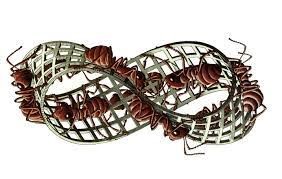Postgraduate School ZRC SAZU invites you to public seminars by dr. Cindy Zeiher.
Cindy Zeiher is senior lecturer at the University of Canterbury, New Zealand were she teaches critical theory. Her writings explore Freudian-Lacanian interventions and interpretations concerning contemporary questions of ontology. She is currently working on a book which interrogates Vladimir Janklevitch’s radical ‘refusal’ of politics from the perspective of Lacan’s theory of the speech-act. Cindy is co-editor of CT&T: Continental Thought and Theory and is currently training as a Lacanian psychoanalyst.
Seminar I. on Monday, 7th March 2022 at 07:00 PM | Warsaw | via ZOOM:
Sensation(all) Ontology.
It is the praxis of being a subject in the world which enables psychoanalysis to theorise subjectivity. Freud theorised subjectivity from the perspective of desires, those repressed unconscious forces which conflict with the subjects’ need to live in the world. The upshot of this conflict for the subject is trauma and for psychoanalysis such trauma provides a way into a remedy, a cure, the presumption of psychoanalysis being that through its method of transference, it does indeed possess the knowledge to pursue a remedy.
Lacan offers a new interpretation of Freud by considering the subject as an ongoing ontological enigma in so far as subjective unconscious desire is not only (potentially) traumatic but necessarily (always) linguistic. How is this an ontological enigma? For Lacan the subject is first and foremost a speaking being engaged in an ongoing struggle to articulate unconscious desire. This is because, claims Lacan, we are born into language which not only pre-exists us but continues after death. In this way subjectivity is inescapably oriented to language as simultaneously intrinsic external to it. The unconscious is therefore a mixture of inside and outside, an enigmatic (pre)ontological space which Lacan calls extimacy.
This seminar seeks to explore Lacan’s orientation of the subject towards extimacy as the site of subjective conflict where, in its quest for the subject’s desire to know and handle the symptom, transference engages a new ontological dimension.
Reading:
- Miller, Jacques-Alain. (2008). Extimity. The Symptom.
Seminar II. on Monday, 16th of May 2022 07:00 PM | Warsaw | via ZOOM:
Where is Dora’s Mother?
My father was standing beside my bed and woke me up. I dressed quickly. Mother wanted to stop and save her jewel-case; but Father said: ‘I refuse to let myself and my two children be burnt for the sake of your jewel-case.’
We hurried downstairs, and as soon as I was outside I woke up.
(Sigmund Freud, Fragment of an Analysis of a Case of Hysteria, Standard Edition, Vol. VII, p. 64).
Much to Freud’s chagrin, Dora chose to remain silent following analysis with him. Dora was a great disappointment to him, a failure he did not hesitate to hide. She ended the sessions in outrage at Herr K’s declaration that his wife Frau K did not mean anything to him and that he no longer desired her. As the story goes, ‘The Lake Scene’ depicts his clumsy attempt to seduce her and make her his mistress. To us now, Dora’s persistent cough during analysis in which her mother is hardly mentioned, signals a strange malady of the voice. Freud did cure Dora’s cough, but not it seems her anguish, whilst because Freud privileged paternity, Dora’s mother remained an unanswered question.
What was so traumatic about Dora’s revelation of Herr K’s attempt to seduce her was not only his dogged persistence but also his sundry dismissal of Frau K without understanding that she was in the position of feminine jouissance for Dora. Dora confided in Frau K, sometimes at length; she enjoyed her company and trusted her. What is also striking is that Dora’s mother, usually portrayed as obsessively neurotic, is given no part to play in the unravelling relationships of this bourgeois Viennese family. In Écrits Lacan also barely mentions her in his critique of Freud, instead commenting on Otto, Dora’s brother. This is a curious omission, given that the Mother, the original object of desire, is a pivotal concept of psychoanalysis.
This seminar attempts to track a different reading of Dora’s Mother, not as failed feminine jouissance or as an obsessive woman trapped in a loveless marriage, but rather as a case of silenced jouissance from which Dora’s mother peripherally contributes to her daughter’s burning question: what does it mean to be a woman?
Reading:
- Sigmund Freud: Fragment of an Analysis of a Case of Hysteria (‘Dora’): 1901: SE vol. VII: p1-122 or Penguin Freud Library: Vol 8 – Case Histories I: 1990. Please read pp. 70-108 specifically
Kindly invited!


